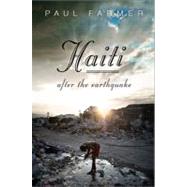Haiti After the Earthquake
, by Farmer, Paul- ISBN: 9781586489731 | 1586489739
- Cover: Hardcover
- Copyright: 7/12/2011
On January 12, 2010 a major earthquake struck near Port-au-Prince, Haiti. Hundreds of thousands of people died, and the greater part of the capital was demolished. Dr. Paul Farmer, U.N. deputy special envoy to Haiti, had worked in the country for nearly thirty years, treating infectious diseases like tuberculosis and AIDS. No one understood better than he how painful it was that Haiti, the site of so much suffering, would have to endure another disaster. It was, in his words, a "cruel cosmic joke." Farmer and former President Bill Clinton, the U.N. special envoy to Haiti, had just begun to work on an extensive development plan to improve living conditions in Haiti. Now their project was transformed into a massive international rescue and relief effort. In his own words, Farmer documents this effort, including the harrowing obstacles and the small triumphs. Support came in the form of dozens of humanitarian groups and a flood of money. Despite this outpouring of aid, the challenges were astronomical. U.N. plans were crippled by Haitirs"s fragile infrastructure and the death of U.N. staff members who had been based in Port-au-Prince. As the humanitarian operations grew, questions about their effectiveness mounted. By some estimates, Haiti had more NGOs per capita than any other place on earth. And yet, Haitians were still suffering from a lack of basic services, from a lack of food, water, and shelter. Farmer shows how the earthquake heightened the problems in Haiti and argues that these long-term challenges cannot be ignored. In chronicling the relief effort, Farmer draws attention to the social issues that made Haiti so vulnerable to this natural disaster. Now that their already weak public-health system has been further damaged, Haitirs"s poor are even more vulnerable to fresh onslaughts of diseases like cholera and typhoid. Yet Farmerrs"s account is not a gloomy catalog of impenetrable problems. As devastating as Haitirs"s circumstances are, its population manages to keep going. Farmer shows how, even in the barest camps, Haitians organize themselves, creating small businesses such as beauty parlors. His narrative is interwoven with stories from Haitians themselves, from doctors and others working on the ground. Ultimately this is a story of human endurance and humility in difficult circumstances. Once again, Paul Farmer reveals what can be accomplished in the face of seemingly overwhelming odds.







